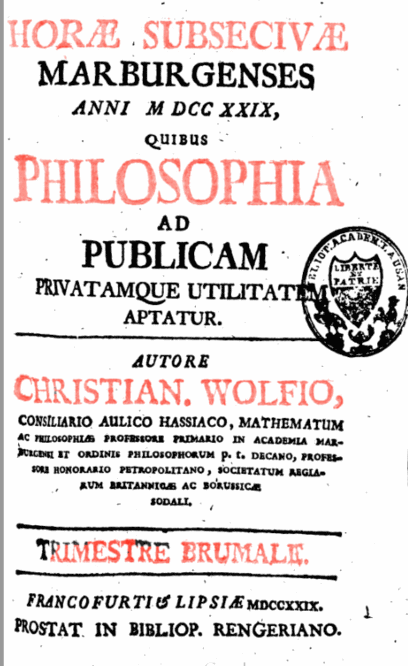If a book has a cryptic title like that, it is always a good idea to look whether perhaps the author explains the title in the preface.
The preface starts thus:
Etsi magna negotiorum mole quotidie me obrutum esse non ignorent, qui labores meos perspectos habent; in felicitatem tamen generis humani pronus cum id unice mihi datum esse existimem, ut aliis inserviendo consumar, Patronis jubentibus, amicis rogantibus, facile me adduci passus sum, ut speciminibus docerem, quomodo philosophia ad publicam privatamque utilitatem aptanda sit, cum longum iter per praecepta, breve per exempla deprehendatur. Tempus igitur huic labori impendendum ordinariis negotiis detrahere debui, quasi animum labore fessum recreaturus, cum voluptatem noverim nullam, nisi quae ex studio aliis inserviendi proficiscatur. Atque ea ratio est, cur specimina ista sub titulo horarum subcesivarum per trimestria intervalla in lucem prodeant. Cum vero Marburgi hoc otio mihi perfrui datum sit, quo non ad pompam, sed ad utilitatem philosophari licet; horas istas subsecivas Marburgenses appellandas esse duxi, ut omnes intelligant Marburgum esse eam Musarum sedem, ubi non ventositati, sed soliditati ac utilitati litatur.
Although those who know my work in and out will know that I am daily overwhelmed by the great weight of my business, yet disposed as I am toward the happiness of the human race, as I reckon it is uniquely given to me to be employed in the service towards others, I suffered it gladly to be prevailed upon, by order of my patrons and by the appeal of my friends, to teach by examples how philosophy may be adapted for public and private use, for the long road is taken by way of rules, the short one by way of examples. The time, then, to be expended for this work, I had to take away from my normal business, as if to refresh the mind exhausted by work, given that I know no joy but that which originates in the exertion to serve others. And that is the reason why these examples are brought forth, in three-month intervals, under the title of overtime hours. And since it is in Marburg where I am given this opportunity to use to philosophise, not for showiness, but for usefulness; I hold that these overtime hours ought to be called Marburgian, so everyone will know Marburg is that seat of the Muses where we dedicate ourselves not to blowing hot air, but to solidity and usefulness.
I chose the translation overtime hours. The meaning from Lewis & Short which best applies here is:
Of that which is done in extra time, etc., accessory work, over-work
The only problem I see is that Wolff explicitly says he had no time to spare and had to take the time away from his ordinary business, so … it's not really overtime? But I think that is the general sense. Perhaps one could also say “extra hours.”
Note that Wolff once spells the word subcesivarum and then subsecivas, which is wild. (Both forms are attested, but come on, choose one.)
